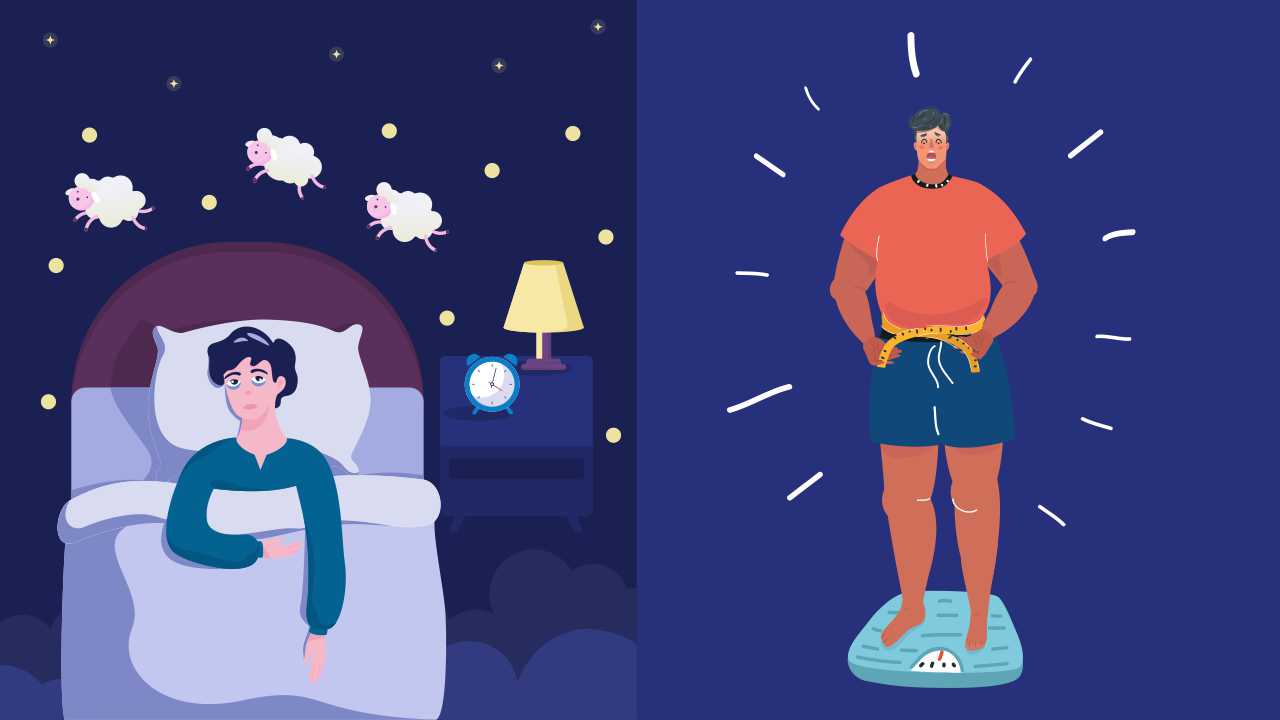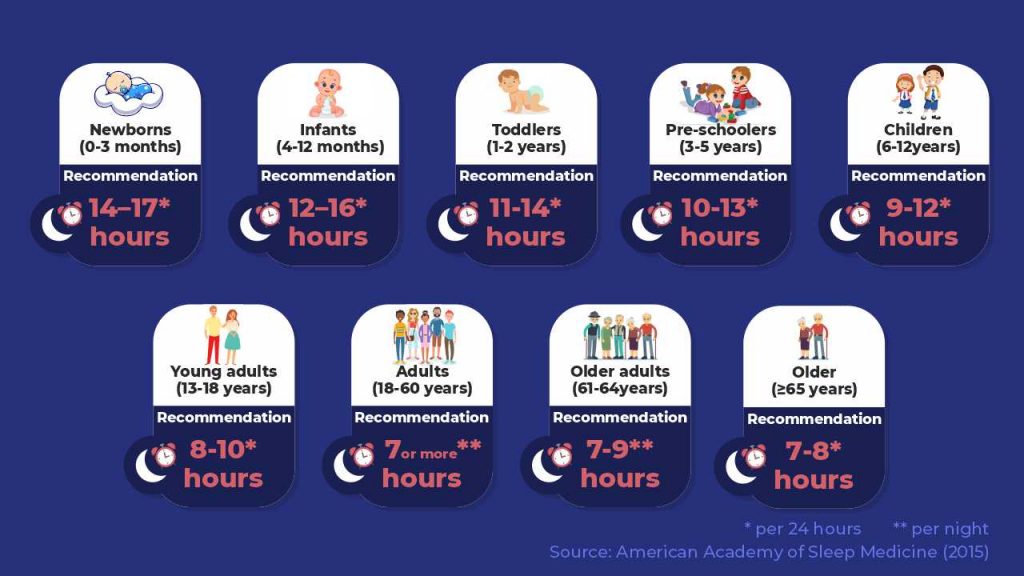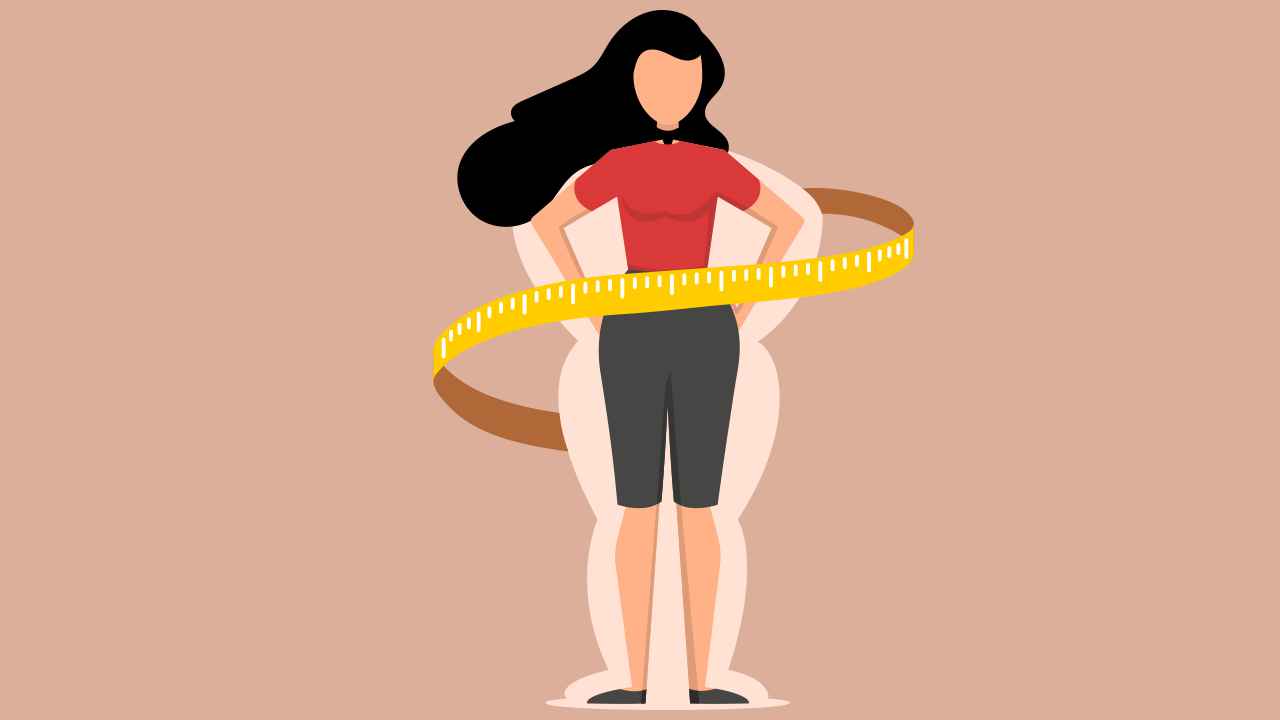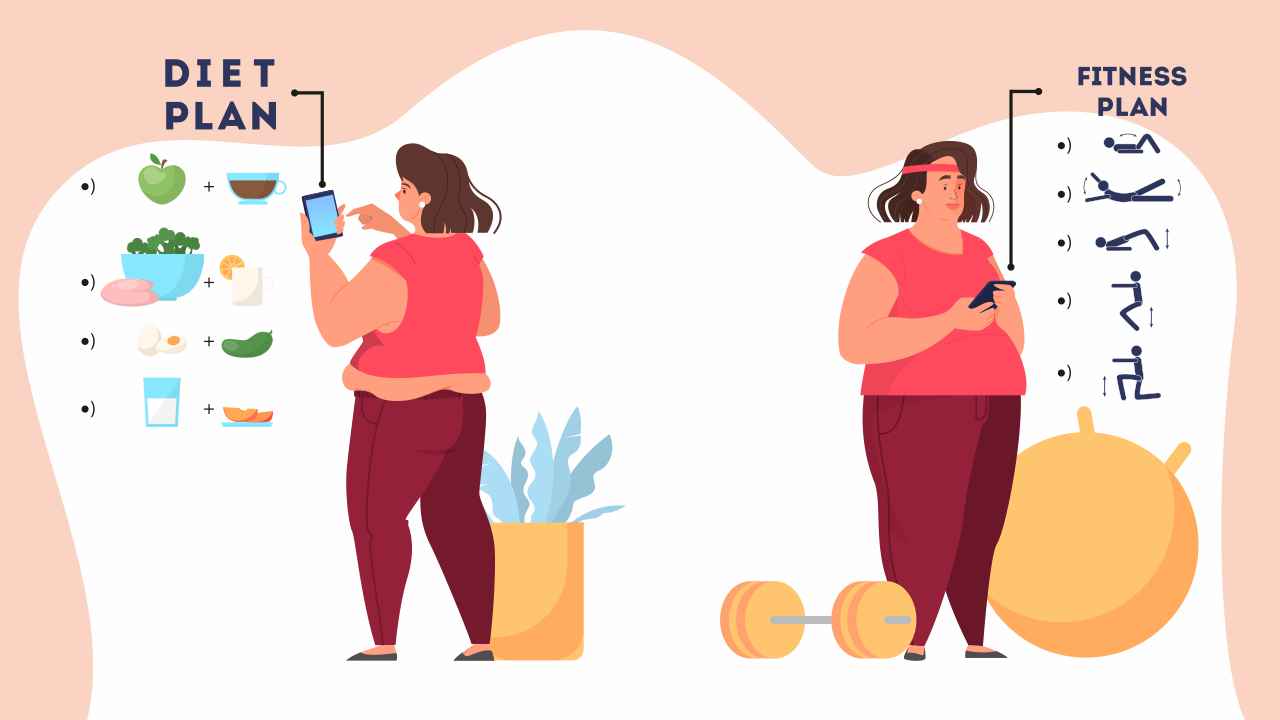
Can Lack of Sleep Make You Gain Weight?

The exponential rise in global obesity rates over the past three decades has been accompanied by a trend of reduced sleep duration and quality sleep in adults and children. Modern human society is active around the clock, with late or all-night work and leisure activities being part of an average individual’s life. All of these lead to a sacrifice in sleeping hours and affect the quality of sleep as well. It upsets the body’s mechanisms of hunger control and energy balance, therefore increasing the risk of obesity.
Let’s find out why sleep is a crucial part of your weight loss journey, and the ways in which you can improve the span and quality of your snooze.
Why do you need to sleep?
Sleep is as necessary as food and water for survival. Consistent and restorative sleep powers your mind, revives your cells, and fortifies every system in your body. The sleep-wake cycle is regulated by circadian rhythms, which are natural 24-hour timing systems or internal body clocks. These systems consist of a central brain clock connected with numerous peripheral clocks present in all body cells. Circadian rhythms are also responsible for the coordination of many other daily processes that are necessary to maintain body weight and fat. These include the regulation of food intake, energy expenditure, and metabolic processes.
Can sleep deprivation make you gain weight?
Habitual sleep deprivation can raise the chances of obesity. Moreover, if you do not sleep well, all the efforts that you have put in over the months to lose weight — by exercising and following a proper diet — will go in vain. According to a study published in the Annals of Internal Medicine, those who were on a diet and slept for less than seven hours per night over two weeks, experienced that their fat loss declined by 55% even when their calorie intake remained the same.
Impact of sleep deprivation on the body
You may be curious to know how sleep deficiency has a significant effect on the body’s ability to balance energy and store fat. What can lack of sleep do?
1. Disrupts the delicate balance between hunger and satiety hormones
Several studies have shown that sleep restriction increases the levels of ghrelin, a hunger-promoting hormone, and decreases the production of leptin, the hormone that gives a sense of fullness after eating. This combination may increase your appetite and the likelihood to overeat, therefore making it difficult to adhere to a low-calorie diet plan. Leptin is also involved in energy regulation and utilization of body fat. So, its decline may also reduce energy expenditure and increase the body’s fat.
2. Causes changes in the reward centers of the brain
A brain-imaging study published in the International Journal of Obesity found that subjects who slept for only four hours over six nights had increased activity in the brain’s areas. These activities were associated in response to delicious food compared to people who slept for nine hours. The resulting impairment of impulse control was found to intensify cravings for foods rich in fats and sugars and consume meals in larger portion sizes. This resulted in an overall increase in food consumption, which included eating more snacks.
Another brain-imaging study looked at the effect of sleep deprivation on the emotional processing centers of the brain. It observed that sleep-deprived people were predisposed to react emotionally rather than choose a well-thought-out response during difficult situations. So, a lack of sleep may make it much harder to stop yourself from having a bar of chocolate when you are feeling low or upset.
3. Results in metabolic grogginess
Just like your brain, your body’s metabolism feels disoriented and uncoordinated after a poor night’s sleep. This metabolic grogginess particularly affects your body’s ability to process insulin, a hormone needed to send glucose to your cells and tissues for energy.
Researchers observed that just four days of insufficient sleep led to a 30 percent decline in the body’s response to insulin
In such a scenario, the body’s capability to break down glucose and process fats from the bloodstream decreases. So, it ends up storing the glucose as fat. Also, long-term sleep deprivation, while on a calorie-restricted diet, induces changes in metabolism that encourage the body to burn muscle instead of fat. If this metabolic dysregulation persists over a long time, it may raise the risk of type-2 diabetes, hypertension, and heart disease.
4. Impairs exercise performance and post-exercise recovery
Another link between sleep deprivation and weight gain is that sleep debt increases sedentary behavior. A sleepy and tired person is less likely to stick to his or her workout routine. This theory is supported by studies on school children. It found that those with irregular sleep schedules spent less time playing and exercising.
Adequate, good-quality sleep is important for optimum recovery of muscles after exercise. So, if you do not get the necessary nighttime rest, you will wake up with sore muscles and may feel less motivated to hit the gym the next day.
Also watch: Should you workout after poor sleep?
How much sleep do you need to stay fit?
The ideal sleep requirement varies as per an individual’s age. According to the American Academy of Sleep Medicine, the recommended sleep times are divided into nine age groups, as explained here:

Tips to ensure your beauty (or slimming) sleep
A six-year-long study on individuals who slept for less than six hours a day reported that increasing sleep time by just an hour can decrease the risk of obesity by 30 percent. However, this trend has to be followed every night to be effective. So, catching up on four hours of sleep lost during the weekdays by sleeping for 10 hours on the weekends will not do the trick, especially when you are on a calorie-controlled diet. You can follow these ideas to make sure that you get good-quality sleep every night.
1. Set up a sleep schedule
Consistency is key to regulating your internal body clocks. You can do that by first understanding how much sleep you require every day, as each individual’s needs vary. The next step would be setting a fixed time to hit the bed and waking up, and sticking to it every day, including weekends. It is ideal to wake up at the same time daily. By following this schedule you are exposing yourself to daylight. Additionally, this may help align your circadian rhythm.
2. Sleep in a dark and cool environment
Melatonin is a hormone released by the brain when it is dark, telling the body that it is time to sleep. Sunlight or exposure to light inhibits the production of melatonin. So, make sure that your bedroom is completely dark. Get rid of night lights and invest in thick curtains to block any light from outside.
Sleeping in cooler temperatures improves sleep quality and helps you burn more calories overnight. It is one of the ways sleep can help you get slim
According to a study published in the journal Diabetes, people who maintained their bedroom temperature at 19°C boosted their metabolism by 10 percent.
3. Keep your bed a device-free zone
Most of us have the habit of scrolling through social media or watching videos before shutting our eyes for the night. This can drastically reduce the period and quality of sleep. Research has shown that nighttime exposure to blue light, which is emitted by smartphones, tablets, laptops, and LED lights, suppresses the production of melatonin for twice as long as natural light. Moreover, it may shift the body’s circadian rhythms. Another study found that exposure to blue light at night increases hunger and decreases insulin function, which can result in weight gain and disrupt the body’s fat-burning power. So, avoid using all electronic devices for at least half an hour before going to bed.
4. Manage your stress levels
Hormones like cortisol, norepinephrine, and adrenaline are secreted in response to stress due to which the body is awake and alert. Stress also reduces the production of serotonin, the body’s happy hormone, which acts as a precursor to melatonin. So, if you are under constant stress, then chances are that both your sleep quality and quantity will be impaired due to increased circulating levels of wakefulness hormones and decreased levels of sleepy hormones. Controlling your stress levels through meditation and mindfulness techniques may significantly improve your sleep.
Also listen: Dr. Amy Bender on the Importance of Sleep and How to Sleep Better
5. Adopt consistent bedtime rituals
Consistently practicing bedtime habits every night may reduce the effects of circadian rhythm disturbances on sleep and help you unwind before sleeping. These activities include:
- Having a warm bath to help your body reach an ideal temperature for sleeping
- Doing light stretching exercises like yoga to relax the muscles
- Listening to soothing music
- Following a guided relaxation session
6. Eat a light dinner and avoid midnight snacking
You must have heard the saying “breakfast like a king, lunch like a prince, and dine like a pauper”. This proverb might be old, but it is quite true. Eating a heavy dinner close to bedtime will result in you tossing and turning all night. It will increase the chances of heartburn and make you store more body fat. Late-night snacking can trigger a vicious cycle, as it can make it more difficult for you to fall asleep. This may lead to lighter, insufficient sleep. So, eat a light dinner and a heavy breakfast. Also, reserve snacking for mornings and afternoons.
7. Avoid drinking coffee around bedtime
Adenosine is a neurotransmitter that accumulates in the brain during the day, and at high concentrations, it makes us sleepy at night. Caffeine present in coffee blocks the brain’s receptors for adenosine, therefore impairing the function of the central brain clock. So, have your last cup of coffee at least six hours before your bedtime.
Along with following a proper diet and exercise regime, getting at least seven hours of quality sleep is essential for a weight management strategy to be effective.
Now that you know how sleep impacts weight loss, follow the aforementioned tips religiously to get the restorative sleep your body needs to be in shape. If you still have trouble falling asleep for more than three days a week, seek medical help, as you may be suffering from insomnia.
References
1. Greer SM, Goldstein AN, Walker MP. The impact of sleep deprivation on food desire in the human brain. Nature Communications 2013; 4: 1-7.
2. Beccuti G, Pannain S. Sleep and obesity. Current Opinion in Clinical Nutrition and Metabolic Care 2011; 14: 402.
3. Stenvers DJ, Scheer FA, Schrauwen P, et al. Circadian clocks and insulin resistance. Nature Reviews Endocrinology 2019; 15: 75-89.
4. McHill AW, Phillips AJ, Czeisler CA, et al. Later circadian timing of food intake is associated with increased body fat. The American Journal of Clinical Nutrition 2017; 106: 1213-9.
5. Depner CM, Melanson EL, Eckel RH, et al. Ad libitum weekend recovery sleep fails to prevent metabolic dysregulation during a repeating pattern of insufficient sleep and weekend recovery sleep. Current Biology 2019; 29: 957-67.
6. Geiker NRW, Astrup A, Hjorth MF, et al. Does stress influence sleep patterns, food intake, weight gain, abdominal obesity and weight loss interventions and vice versa? Obesity Reviews 2018; 19: 81-97.
7. Nedeltcheva AV, Kilkus JM, Imperial J, et al. Insufficient sleep undermines dietary efforts to reduce adiposity. Annals of Internal Medicine 2010; 153: 435-41.
8. Watson NF, Badr MS, Belenky G, et al. Recommended amount of sleep for a healthy adult: a joint consensus statement of the American Academy of Sleep Medicine and Sleep Research Society. Sleep 2015; 38: 843–4.
9. Cheung IN, Shalman D, Malkani RG, et al. Evening blue-enriched light exposure increases hunger and alters metabolism in normal weight adults. Sleep 2014; 37.
10. Bo S, Ciccone G, Durazzo M, et al. Contributors to the obesity and hyperglycemia epidemics. A prospective study in a population-based cohort. International Journal of Obesity 2011; 35: 1442-9.
11. Lee P, Smith S, Linderman J, et al. Temperature-acclimated brown adipose tissue modulates insulin sensitivity in humans. Diabetes. 2014; 63: 3686-98.
13. Yoo SS, Gujar N, Hu P, et al. The human emotional brain without sleep—a prefrontal amygdala disconnect. Current Biology 2007; 17: R877-8.
14. Dweck JS, Jenkins SM, Nolan LJ. The role of emotional eating and stress in the influence of short sleep on food consumption. Appetite 2014; 72: 106-13.













